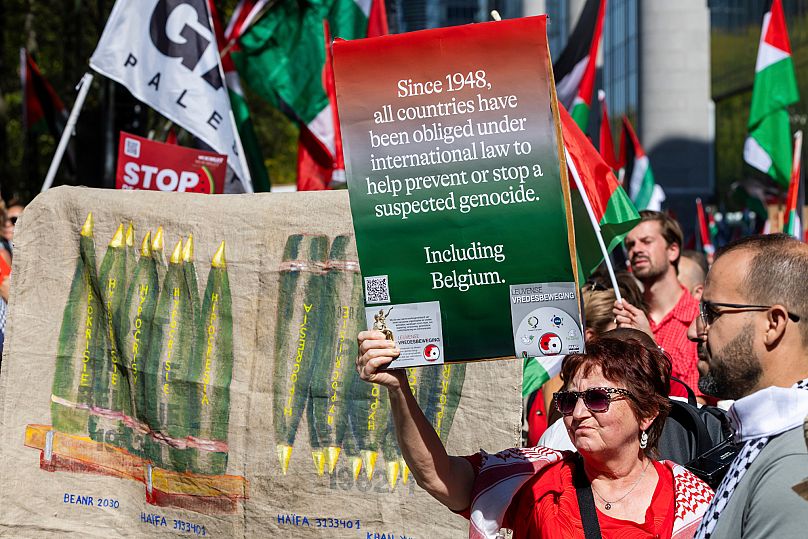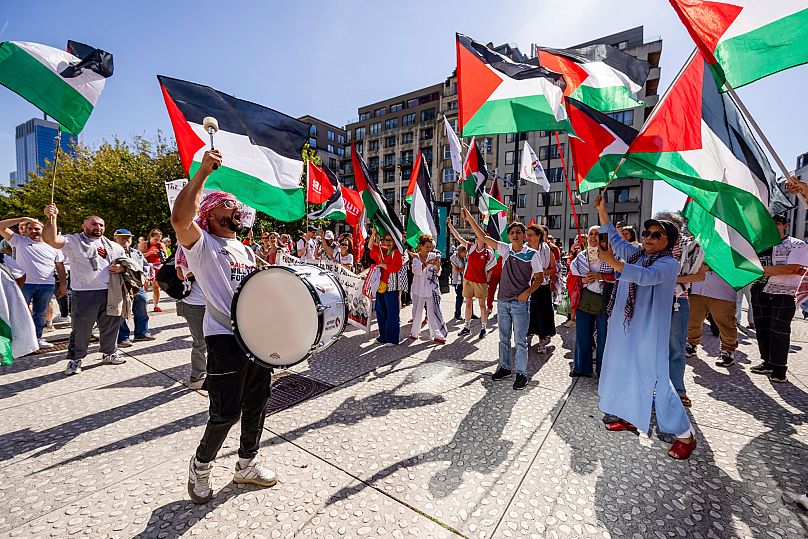It comes days after Belgium announced it would impose sanctions against Israel and recognise Palestine at the UN General Assembly later this month, protest organisers say this is the result of public pressure, and urge demonstrators to keep taking to the streets.
 ADVERTISEMENT
ADVERTISEMENT
Tens of thousands of demonstrators wearing red gathered in Brussels on Sunday to protest against the Israeli government and to draw a symbolic red line against its war in Gaza. Protesters are also calling on EU member states to take a tougher stance and impose firm sanctions against Israel.
Local police estimated around 70,000 demonstrators took part in the second edition of Brussels' 'Red Line for Gaza' march, but protest organisers estimate 110,000 people attended the march across the Belgian capital, which was 3.5 kilometres long.
More than 200 human rights groups and aid agencies, including Oxfam, Doctors without Borders, Amnesty International, Greenpeace, Save the Children, and more, participated and are drawing the red line.
The protest comes days after Belgium announced it would join the United Kingdom and France in recognising a Palestinian state at the United Nations General Assembly later this month, and would impose sanctions against Israel, under certain conditions.
"The compromise that the government reached would never have been there if we would not have had the previous march and launched Oxfam's 'Speak up for Palestine' campaign, now with 100,000 signatures," Katrien Van der Heyden, Teamleader Education at Oxfam Belgium told Euronews, emphasising the importance maintaining public pressure on EU politicians.
Oxfam Belgium teamed up with hundreds of Flemish actors, artists and influencers in launching the 'Speak up for Palestine' action. The campaign has already raised 100,000 signatures calling for a permanent ceasefire and an end to the violence and illegal occupation in Palestinian territories, safe and unrestricted access to humanitarian aid for Palestinian civilians, and the introduction of economic sanctions on Israel.
While many demonstrators in Brussels acknowledged it is a step forward, they are not satisfied with the compromise that was reached, and want to see Belgium further toughen its stance against Israel, with uncompromised sanctions, and for EU member states and the European Union itself to follow suit.
"You don't compromise about children's lives, people's lives," Van der Heyden said. "You don't compromise as a government. You have to draw a red line, which is non-negotiable."
Van der Heyden, pointed out that a standing discrepancy divides the public and EU politicians, with a stark contrast "between the rage that people feel and the feeling of injustice and then the extreme immobility of politicians."
"We have been asking our politicians for two years to intervene in Palestine," Isja Puissant, spokesperson for the Global Movement to Gaza in Belgium told Euronews, "they are still just discussing about the recognition of a Palestinian state by the end of September, when in reality, there might not be any Palestinians left by that time."
The Global Movement to Gaza is a grassroots coalition consisting of 44 countries that are dedicated to ending the blockade of Gaza.
Last week, twenty ships with more than 300 crew members as part of the Global Sumud Flotilla departed from the port of Barcelona in an effort to establish a humanitarian corridor, ships from other countries, including Tunisia and Italy, will join efforts to break the siege.
Earlier this week, a convoy from Italy's Genoa joined the flotilla. After several delays, the Gaza-bound boats are now expected to set sail from Tunisia on Wednesday.
European solidarity movement
In recent weeks, numerous pro-Palestine demonstrations took place across the continent, including in Ireland, Italy, Germany, the United Kingdom and Spain. The rise in European solidarity comes in response to Israel's expanded offensive in Gaza, which had drawn international condemnation, and the catastrophic humanitarian conditions in the Strip.
In June, the first edition of the march in Brussels took place, where at least 75,000 people took to the streets of the Belgian capital. The 'Red Line for Gaza' march has also already twice been held in the Netherlands, which resulted in a massive turnout both times.
Red lines have also been appearing in various shop windows in major Belgian cities, a way for retailers to show their solidarity with the movement.
The war on Gaza began after Hamas-led militants attacked southern Israel on 7 October 2023, killing around 1,200 people, many of them civilians.
Hamas took 251 people as hostages, and is currently holding 50, of whom 20 are believed to be alive. A subsequent Israeli offensive has to date killed more than 64,000 Palestinians, mostly women and children, according to the Hamas-run Gaza Health Ministry whose figures do not distinguish between fighters and civilians.
Large swathes of Gaza have been levelled and most of the territory's more than 2 million people have been displaced. The UN has declared famine is now occurring in the Gaza governorate, and expects it will expand to Deir al Balah and Khan Younis by the end of this month.












